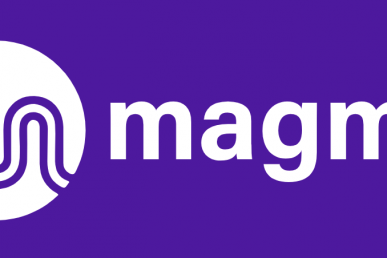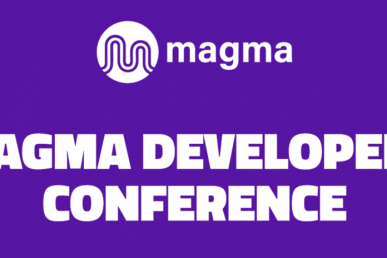2020 redefined collaboration. While the global community was not able to meet in person, everyone still convened to discuss how we collaborate to deliver the Open Infrastructure (OpenInfra) Foundation’s mission: building communities who write software that runs in production. In 2020, Magma’s code and documentation were contributed to a new, independent software project magmacore.org and the need for the services provided by OpenDev has become more apparent; OpenDev has stepped to the plate and made a number of changes to help make 2020 as productive as possible all while minimizing disruption to existing services and users.
Magma
Magma is an open-source software platform that delivers an open, flexible and extendable mobile network core solution. Magma’s mission is to connect the world to a faster network by enabling service providers to build cost-effective and extensible carrier-grade networks. It is designed to be access network agnostic (4G, 5G or WiFi), flexibly supporting a radio access network with minimal development and deployment effort.
Magma was developed as an open-source project as part of Facebook Connectivity’s incubator program, with significant contributions from the OpenAirInterface Software Alliance. In July of 2020 Magma’s code and documentation was contributed to a new, independent software project magmacore.org.Magma’s architecture consists of three major subsystems:
- The Access Gateway (AGW) provides network services and policy enforcement. In an LTE network, the AGW implements an evolved packet core (EPC), and a combination of an AAA and a PGW. It works with existing, unmodified commercial radio hardware. Support of 5G radios is under active development.
- Orchestrator is a service that provides a simple and consistent way to configure and monitor the wireless network securely. The orchestrator can be is normally hosted on a public or private cloud. The metrics acquired through the platform allow you to see the analytics and traffic flows of the wireless users through the Magma web UI. Orchestrator also provides REST APIs allowing simple integration with monitoring and management systems.
- The federation gateway allows Magma to integrate with other Mobile Network Operator core network functions using standard 3GPP interfaces. It acts as a proxy between the Magma AGW and the operator’s network and facilitates core functions, such as authentication, data plans, policy enforcement, and charging to stay uniform between an existing MNO network and the expanded network with Magma.
Community
At the OpenInfra Summit in October 2020, the OpenInfra Foundation announced its support of the Magma project. With help from the Foundation, magmacore.org has been structured to make it easy to contribute to the project. It is centered around a developer-led governance with Maintainers providing code review and approval for contributions and a small Technical Committee selected from among the project maintainers providing overall architecture and roadmap oversight. In addition, the OpenInfra Foundation also helped launch the Magma Slack workspace back where many community and technical conversations take place. After the Summit announcement, the Slack workspace grew by over 100 people.The OpenInfra Foundation also assists with the monthly Magma community meetings where project updates and use cases are presented. Community members also get the opportunity to ask questions directly to the Magma engineers. The first community meeting took place in November 2020 and had over 20 attendees. View the meeting recordings here.
OpenDev
OpenDev believes that free software needs free tools. OpenDev is a collaboratory for open source software development at a huge scale. Its focus is on code review, continuous integration, and project hosting provided exclusively through open source solutions like Git, Gerrit, Zuul, and Gitea.
As the world shifted to remote work and online collaboration in 2020, the need for the services provided by OpenDev has become more apparent. OpenDev has stepped to the plate and made a number of changes to help make 2020 as productive as possible all while minimizing disruption to existing services and users. In particular we would like to call out the new formalized governance for the project, new services like meetpad, and service upgrades (like Gerrit).
In 2020 OpenDev formalized its governance with two main bodies: the Service Coordinator and the Advisory Board. The Service Coordinator is an individual elected from OpenDev’s contributors whose primary role is to communicate planned changes to users and incorporate their feedback. The Advisory Board is made up of liasons from the various projects using OpenDev and organizations that contribute compute resources. They serve as the primary communcation point between users and the service. If you represent an OpenDev using project or a contributing organizationand would like to get more involved feel free to join the Advisory Board.
One of the big changes we have had to deal with as a community is the transition to virtual events. The OpenDev team has deployed a Jitsi Meet instance which is paired with our Etherpad service to act as a video conferencing with built in note taking tool. This service has been used in multiple Project Team Gatherings at this point and helped us keep an event format that is familiar to those who have attended in person events. Outside of events we have seen this service used for team meetings and other places where video conferencing is helpful. We expect this service to replace the existing Asterisk based phone conference tools that we previously deployed.
Several services have also seen major upgrades during 2020. The most notable (and likely noticeable) is Gerrit, but Gitea and Etherpad have also been upgraded. For Gerrit this upgrade was long overdue and gets us much closer to a modern upstream Gerrit experience. We are hoping that this change will help us work with upstream Gerrit more closely going forward, bringing our needs into upstream development. A number of features come with this upgrade including use of NoteDB for data storage and single page diffs. We continuously upgrade our Zuul deployment, but over the course of 2020 it got some major new features and a new look to its web dashboard as well.
Our long running effort to migrate away from Puppet for service deployments and configuration management continues. Several more services have been migrated onto Ansible and Docker including Hound, Grafana, and our IRC accessbot. This effort enables us to use tools that more developers are comfortable with to manage our services and gives us better control over what is being deployed.One of the major tools that has enabled our transition to well tested Docker based deployments is Zuul’s image build pipeline job library. Zuul provides a set of building blocks to run Docker image builds for changes using local image repositories to share the resulting images between test jobs and changes. This allows any OpenDev user to test sequences of changes to different services and know that each change in the sequence is a landable production state.
On the continuous integration side of the house our CI jobs helped 1,800 users merge more than 54,000 changes. We continue to keep our test environments up to date, pulling in new distro releases and removing old EOL versions. Keep this in mind as CentOS’s announcement that version 8 will be EOL at the end of 2021 means that we will be removing it at the end of this year. CentOS Stream 8 test nodes are available as are alternative distros with long term support and stable releases.
OpenDev continues to be a community run project. These services exist because we all help work together to make it happen. 2020 was a difficult year in many ways, but for OpenDev one of the most noticeable difficulties has been losing individuals who have long been a part of the community providing tremendous amounts of help to OpenDev. We would like to thank Andreas Jaeger and Monty Taylor for all the work they have done over the years. This also serves as a reminder that we can always use more help. If you are interested in getting involved do not hesitate to reach out.Find us at:
- On the mailing list: [email protected]
- On IRC: #opendev on Freenode
- Code review
Looking forward to 2021…
Thank you to everyone in the OpenInfra community for all of the work that went into 2020 and is continuing in 2021 to contribute and support the community! Check out the full 2020 Annual Report, and join the OpenInfra community to build the next decade of OpenInfra.
- Inside Open Infrastructure: April 2024 - April 3, 2024
- Inside Open Infrastructure: January 2024 - January 18, 2024
- Inside Open Infrastructure: October 2023 PTG Recap - November 15, 2023

)










